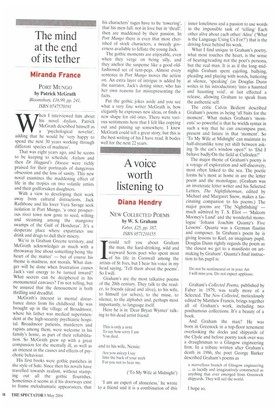The mind at the end of its tether
Miranda France
PORT MUNGO by Patrick McGrath Bloomsbury, £16.99, pp. 241, ISBN 0747570191 When I interviewed him about his novel Asylum, Patrick McGrath described himself as a 'psychological novelist', adding that he would be 'very happy to spend the next 30 years working through different species of madness'.
That was eight years ago, and he seems to be keeping to schedule. Asylum and then Dr Haggard's Disease were richly praised for their portrayals of dangerous obsession and the loss of sanity. This new novel examines the maddening effect of life in the tropics on two volatile artists and their godforsaken daughters.
With a view to developing their work away from cultural distractions, Jack Rathbone and his lover Vera Savage seek isolation in Port Mungo, 'a once prosperous river town now gone to seed, wilting and steaming among the mangrove swamps of the Gulf of Honduras'. It's a desperate place where expatriates use drink and drugs to dull their misery.
We're in Graham Greene territory, and McGrath acknowledges as much with a throwaway line about something being 'the heart of the matter' — but of course his theme is madness, not morals. What danger will be done when frustration causes Jack's vast energy to be turned inward? What secrets can be deciphered in his monumental canvases? I'm not telling, but be assured that the denouement is both thrilling and dreadful.
McGrath's interest in mental disturbance dates from his childhood. He was brought up in the village of Broadmoor, where his father was medical superintendent at the high-security psychiatric hospital. Broadmoor patients, murderers and rapists among them, were welcome in his family's home, as part of their rehabilitation. So McGrath grew up with a great compassion for the mentally ill, as well as an interest in the causes and effects of psychotic behaviour.
His first books were gothic pastiches in the style of Saki. Since then his novels have travelled towards realism, without stamping out all the gothic flourishes. Sometimes it seems as if his doorways exist to frame melodramatic appearances, that
his characters' rages have to be 'towering', that his men fall, not in love but in 'thrall', then are maddened by their passion. In Port Mungo there is even that most cherished of stock characters, a tweedy governess available to fellate the young Jack.
The gothic moments are enjoyable, even when they verge on being silly, and they anchor the suspense like a good oldfashioned set of tent-pegs. Almost every sentence in Port Mungo moves the action on. An extra layer of intrigue is added by the narrator, Jack's doting sister, who has her own reasons for misrepresenting the facts.
Put the gothic jokes aside and you see what a very fine writer McGrath is, how elegantly he expresses new ideas, or finds a new shape for old ones. There were various sentiments here that I felt like copying out and pinning up somewhere. I knew McGrath could tell a great story, but this is the best writing of his I have read. It bodes well for the next 22 years.












































































 Previous page
Previous page